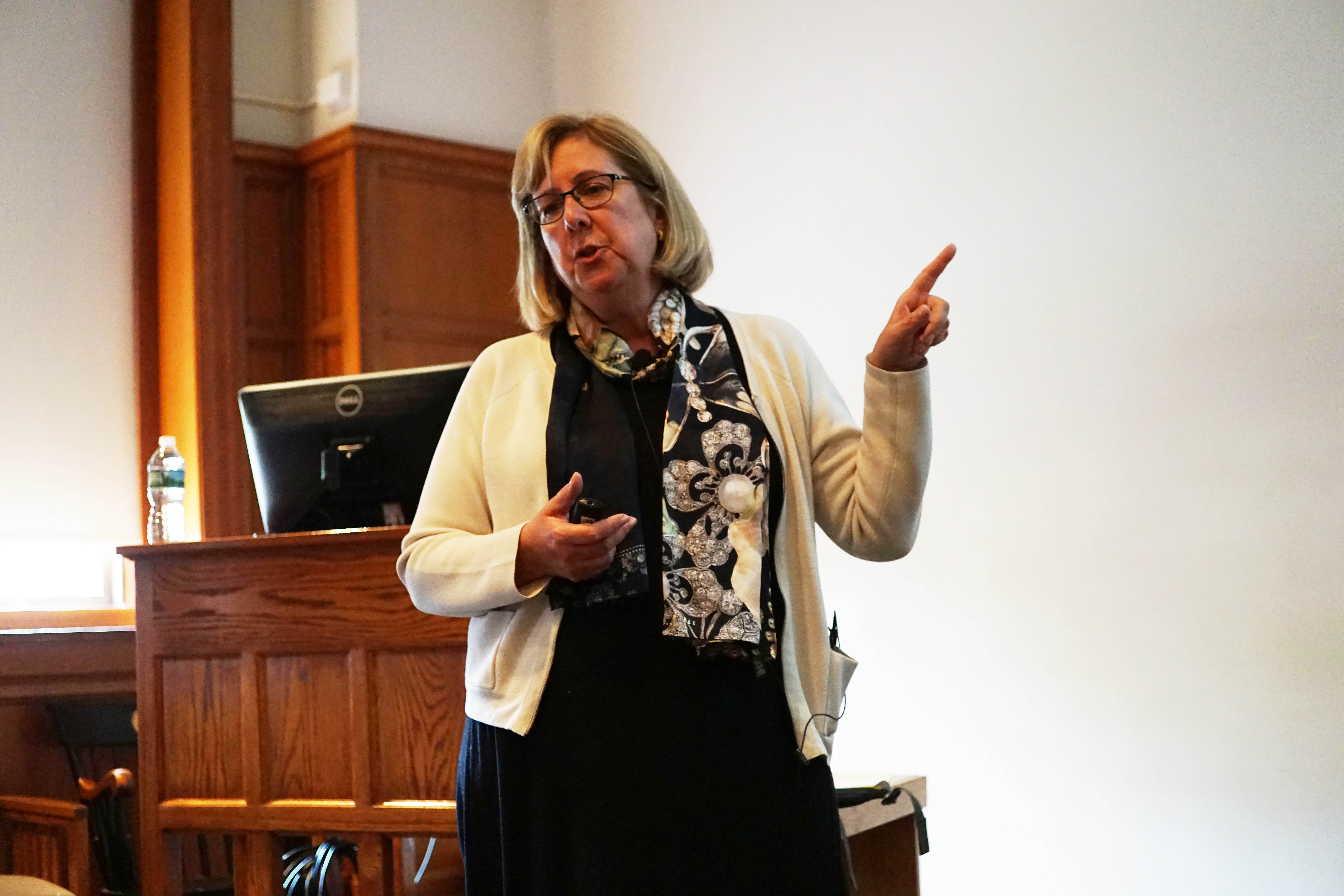

UMass Boston Professor of Philosophy Lynne Tirrell gave a talk titled “Toxic Speech” about linguistics and their societal influence on Thursday, April 20.
Tirrell studies the philosophy of language, politics of discourse and the ways that linguistic practices influence social justice or facilitate injustice. She is currently researching the power of linguistics in shaping social conditions that make genocide possible, focusing on the Rwandan genocide of the Tutsi people in 1994.
Tirrell began by clarifying that her talk would not cover a completed project, but rather research that is still in progress.
She then displayed a photo taken at a Trump rally, noting the “evocative” expressions of the rally members. She would be less “into it” if she were there, she said, acknowledging that “what is toxic to me may not be toxic to the people here.”
Tirrell’s analysis of “linguistic toxicity” connected speech to its harmful effects on people’s physical and social well-being by comparing it to poisonous substances.
“Toxicity is the degree in which a substance, often a poison, can harm people. That’s my basic conception,” she explained. “Toxic speech, like any toxin, is a threat to the well-being or even the very lives of those against whom it’s deployed … The damage can be local or systemic, but toxicity damages all it touches.”
Throughout the presentation, Tirrell mentioned specific examples from historic events, such as Nazism and the Rwandan genocide. She argued that toxic speech still exist today, citing politicians such as Geert Wilders, a far-right Dutch House of Representatives member, and U.S. President Donald Trump.
Victor Klemperer, a German-Jewish linguist who lived in Germany during World War II, was a distinguished veteran in World War I. As a result, he was not persecuted by the Nazi government, and was able to observe the social changes that occurred instead.
“Nazism permeated the flesh and blood of the people through single words, idioms and sentence structures,” wrote Klemperer, whose words were displayed during the presentation. “What happens if the cultivated language is made up of poisonous elements? Words can be like tiny doses of arsenic: they are swallowed unnoticed, appear to have little effect, and then after a little time the toxic reaction sets in after all.”
According to Tirrell, only a special category of toxic speech, which she categorized as “deeply derogatory,” explicitly uses offensive slurs. A more common type of toxic speech, she said, is one that doesn’t explicitly use derogatory terms but still has toxic effects.
As an example, she showed a quote from Elie Mizinge, a soldier during the Rwandan genocide, who highlighted euphemisms that soldiers used to justify their actions.
“What we were doing seemed less unnatural to us if we didn’t have to say it,” Mizinge said. He and other soldiers would use euphemisms like “work,” “clear the tall trees,” “fill the rivers” and “send to Ethiopia” to describe their violent acts, said Tirrell.
“That’s avoiding the language,” Tirrell said. “That was all designed to reconceptualize murder, mayhem [and] rape. You don’t need epithets or other terms of derogation, because often the communication is coded with insider tropes and people know what’s being said.”
These historical examples of toxic speech, she said, are relevant today. During the 2016 U.S. presidential election, Trump announced his candidacy by saying: “You have people coming in and I’m not just saying Mexicans, I’m talking about people that are from all over that are killers and rapists and they’re coming into this country.”
“Explicit epithets were not necessary to poison the [presidential campaign],” Tirrell said. “Speeches by Republican candidates were rife with toxic messages, but none were as overtly divisive as Donald Trump[’s speeches].”
Tyrrell ended her talk by addressing Trump supporters, saying that their joy over the election was similar to chronic illnesses, when the patient suddenly feels better but in reality, something inside is breaking down. “[If] someone that thinks that the administration is great in its xenophobia and is rejoicing … that well-being is rooted in something [that is] not well-being,” she said.
The talk was followed by a Q&A session.
Will Coughlin ’18, who attended the talk, said, “I think it’s interesting seeing how … she differentiated between simple slurs [and derogatory slurs] — like how ‘cockroach’ in America is a slur, but not one of the deeply derogatory terms that she thinks can become dangerous. This depends so much on culture that it’s tough to make a prediction as to which words are important and which aren’t.”
The talk, funded by the Department of Philosophy, was the third in a lecture series called “Speech and Harm.”